Daily Brew: September 30, 2025
Welcome to the Tuesday, Sept. 30, 2025, Brew.
By: Lara Bonatesta
Here’s what’s in store for you as you start your day:
- Two seats on the Georgia Public Service Commission are up for the first time since 2022
- Denver voters will decide eight local ballot measures, including a veto referendum on a flavored tobacco product ban
- Estimates show one-third of U.S. House districts were majority-minority districts in 2024
Two seats on the Georgia Public Service Commission are up for the first time since 2022
Two of five seats on the Georgia Public Service Commission are up for election on Nov. 4. Currently, all five commissioners are Republicans.
The Atlanta Journal-Constitution's Mark Niesse wrote that this is the first election "following three years of canceled races and a court battle over the legality of statewide voting that has elected only one Black candidate to the board."
Commissioners are elected to six-year terms in staggered, even-numbered years. The last time Georgia held public service commission elections was in the 2022 primaries. Georgia was scheduled to hold elections for two seats on the Commission in both 2022 and 2024.
On Aug. 5, 2022, U.S. District Court judge Steven Grimberg ruled that the Commission's use of districts for statewide elections reduced the power of Black voters and that the 2022 general election should not be held using that system. Secretary of State Brad Raffensperger (R) appealed the decision, which the 11th Circuit stayed on Aug. 12, 2022. The U.S. Supreme Court voided the stay on Aug.19, 2022.
In November 2023, the 11th Circuit ruled that Georgia could again hold at-large elections for seats on the public service commission. In March 2024, Raffensperger said the elections would not be held due to challenges to the 11th Circuit's ruling.
In January 2025, Judge William M. Ray II dismissed the case, allowing elections to proceed as a statewide election with districts.
To read more about the lawsuits that caused the cancellation, click here.
The Commission regulates the state's utilities, such as electricity, phones, and gas. While the position is elected statewide, candidates must live in the district they are running in. The commission makes decisions by majority vote.
Incumbent Tim Echols (R) and Alicia Johnson (D) are running in District 2, which covers the eastern part of the state and includes the cities of Athens and Savannah. Echols was first elected in 2010. In his response to Ballotpedia's Candidate Connection survey, Echols wrote he wanted a “Moratorium on Rate Increases,” “More Smart and Clean Energy,” and “additional nuclear reactors to replace aging coal plants.” Johnson is a nurse. In her response to Ballotpedia's Candidate Connection survey, Johnson wrote that she would “push for accountability in PSC decisions,” “Champion for Fair Rates & Renewable Energy”, and “fight to ensure rural communities and historically marginalized neighborhoods aren’t left behind in the energy transition.”
Incumbent Fitz Johnson (R) and Peter Hubbard (D) are running in District 3, which covers much of the Atlanta metropolitan area, including Fulton County and DeKalb County. Governor Brian Kemp (R) appointed Johnson to the commission in 2021. Johnson’s campaign website says he supports ”an America First energy agenda that delivers affordability and reliability for every Georgia ratepayer.” Hubbard has worked in renewable energy development. In his responses to Ballotpedia's Candidate Connection survey, Hubbard wrote that he wanted to “stop the increase in power bills,” “shine sunlight on bad deals,” “enact policies and create a plan that lowers energy costs, reduces emissions, and increases reliability for Georgia’s power grid.” According to the Georgia Recorder, Hubbard also said, “if we’re proposing to build any new nuclear (plants) there must be strict cost controls.”
Bolts Magazine's Camille Squires wrote that turnout from other down-ballot elections could help Democrats: "turnout may be helped by the fact that there will be municipal elections on the ballot in some places, including the mayoral race in Atlanta... [the Democratic candidates] will need very heavy support in the Atlanta region."
University of Georgia Prof. Charles Bullock says that Republicans will have the advantage of incumbency and partisan dynamics: "Georgia is still more Republican than Democratic... It also helps that once we get to the general election ballot, it’ll have the ‘I’ beside their name, indicating they are the incumbents."
In all 50 states, the public service commission is a multi-member board responsible for regulating utilities. Most states' commissions have three seats, though some states have as many as seven seats.
Voters elect commissioners in 10 states, governors appoint commissioners in 38 states, and the legislature chooses commissioners in two states.
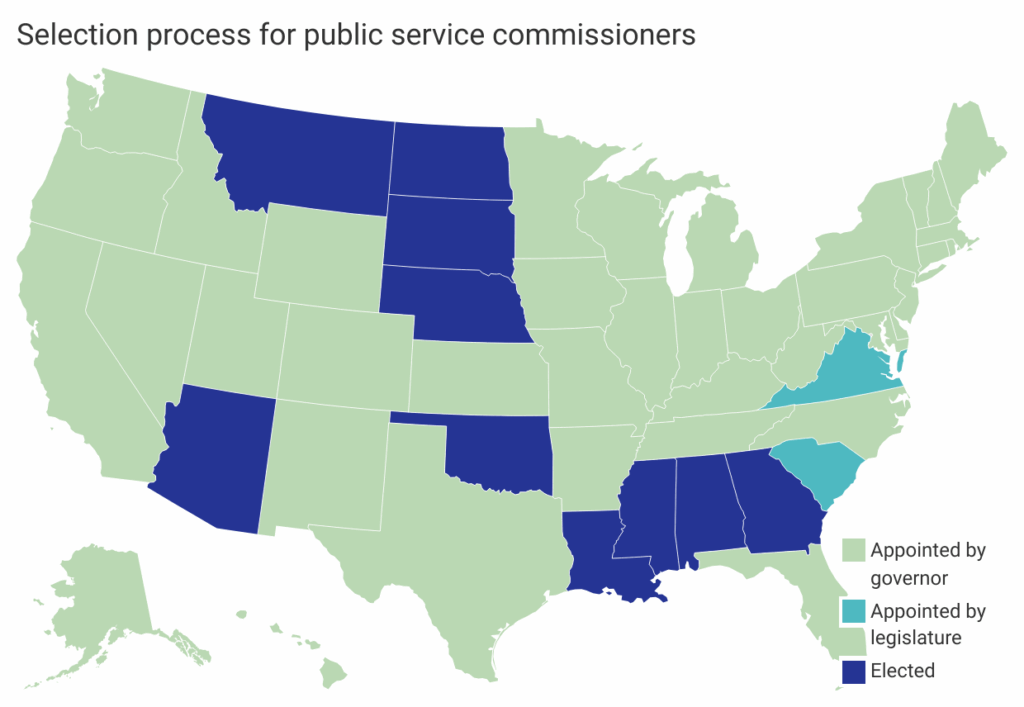
Thirty-nine states have nonpartisan commissions, 10 have majority Republican commissions, and one has a majority Democratic commission.
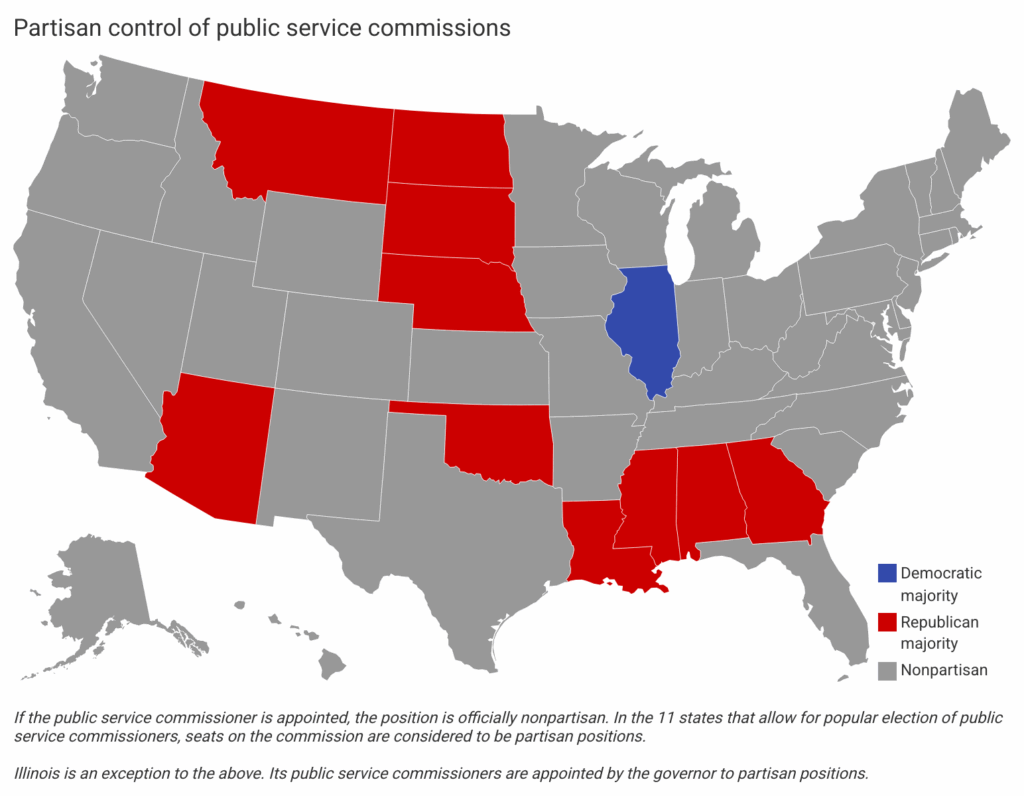
Click here to learn more about each state’s public service commission and here to see our full coverage of the election in Georgia.
Denver voters will decide eight local ballot measures, including a veto referendum on a flavored tobacco product ban
Voters in Denver, Colorado, will decide on eight local ballot measures on Nov. 4. Five are bond measures, two are referred questions, and one is a citizen-initiated veto referendum.
Bond Measures
The Denver City Council put the bond measures on the ballot. If approved, they would fund:
- A new family health center and children’s advocacy center
- Improvements to the city’s parks and recreation facilities
- Construction to improve the city’s transportation and mobility infrastructure
- Improvements to art, cultural, library, and miscellaneous city facilities
- Repairs and improvements to housing designed to reduce rent and increase affordability
Charter Amendments
The two referred measures would amend Denver's charter. One would designate the two at-large positions in the Denver City Council as Seat A and Seat B. The Denver City Council has 13 members, two are elected at-large, and the city’s eleven districts elect the rest. Currently, the two city council at-large positions are on the ballot together, and the seats are awarded to the two candidates who receive the most votes. Under the measure, the seats would be listed separately, and voters would elect one candidate to Seat A and one candidate to Seat B.
The other would change the official names of the city departments and would add the Manager of Licensing and Consumer Protection to the mayor’s cabinet.
Veto Referendum
The veto referendum targets Ordinance 24-1765, which bans the sale of flavored tobacco products. The Denver City Council passed the ordinance 11-1 on Dec. 16, 2024, and Mayor Mike Johnson signed it on Dec. 18, 2024.
The ballot question will ask voters whether the ordinance should be retained. A “Yes” vote would keep the ban in place. A “No” vote would repeal it.
Citizen Power is leading the campaign to overturn the ban. Tobacco companies Philip Morris USA Inc. and Altria have contributed to the campaign. The Rocky Mountain Smoke-Free Alliance, which advocates for vaping businesses in Colorado, has also contributed to the campaign to overturn the ban.
Citizen Power’s website states, “We all agree tobacco and vape products should be illegal for anyone under age 21. But Referendum 310 goes too far. It would ban vape products for consenting adults and would have many negative consequences.” The website says those consequences include closing small businesses, a loss of $13 million in annual revenue, and a threat to the freedom of choice for adults to consume the tobacco products they prefer.
Yes for Denver Kids is leading the campaign to uphold the ban. The committee is a coalition of organizations, including the Colorado Cancer Coalition, the Colorado Medical Society, Kaiser Permanente, and NAACP Denver.
The Yes for Denver Kids’ website states, “Flavored tobacco poses a serious threat to the health of Denver’s kids. Vaping devices can deliver massive doses of addictive nicotine and toxic chemicals like formaldehyde and lead. Over 40% of high-school e-cigarette users are frequent or daily users. This means they aren’t just experimenting with flavored tobacco products. They’re addicted.”
The Denver City Council has said it will not enforce the ban on flavored tobacco products before the Nov. 4 election.
Click here to learn more about the 2025 ballot measures in Denver, Colorado.
Estimates show one-third of U.S. House districts were majority-minority districts in 2024
A majority-minority district is a district in which a racial minority group or groups comprise a majority of the district's total population. According to new U.S. Census estimates, and based on the U.S. House districts enacted after the 2020 census, there were 148 U.S. House majority-minority districts. This represented approximately 34% of the nation's 435 U.S. House districts.
States may create majority-minority districts to prevent the dilution of minorities' voting strength in compliance with the Voting Rights Act of 1965. Section 2 of the Voting Rights Act mandates that no "standard, practice, or procedure shall be imposed or applied by any State or political subdivision to deny or abridge the right of any citizen of the United States to vote on account of race or color."
In 2024, the 148 majority-minority districts in the U.S House spanned 28 states. Twenty-two states had no majority-minority districts.
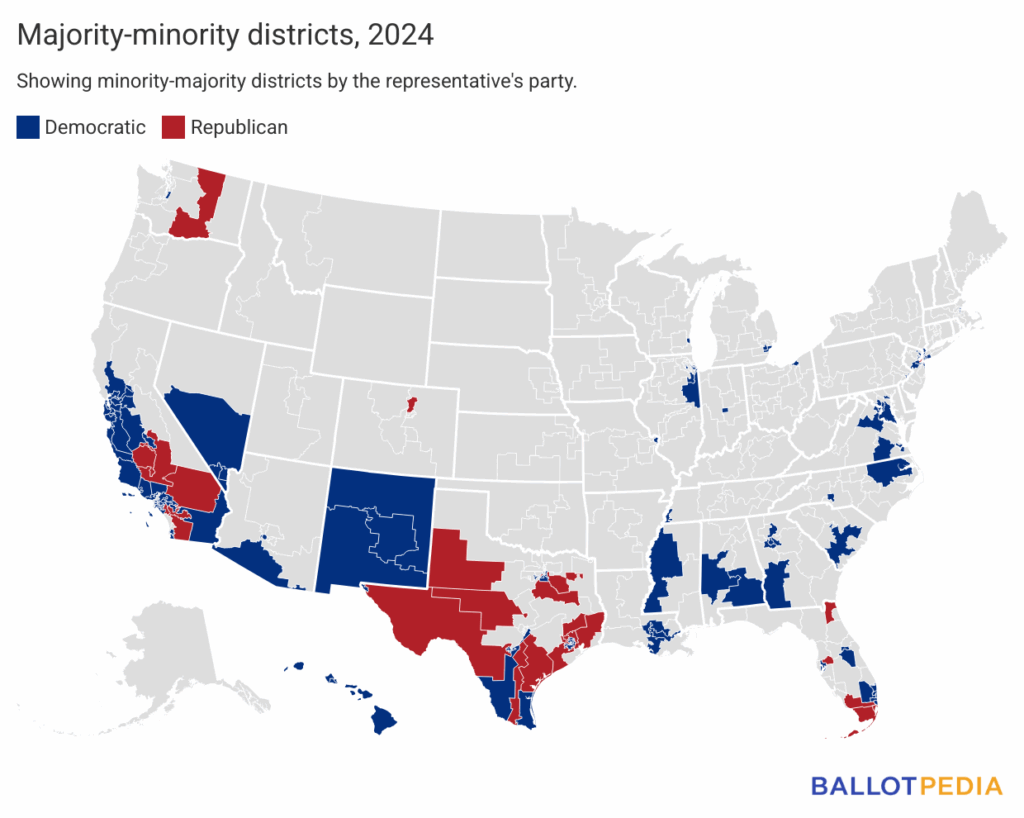
Here’s how the districts break down:
- Democrats represented 122 majority-minority districts, and Republicans represented 26 in 2024.
- California had the most majority-minority districts with 44, or 85% of its 52 total congressional districts.
- Texas had the second-most with 24, or 63% of its 38 total congressional districts.
Here’s how those numbers compare to previous years.
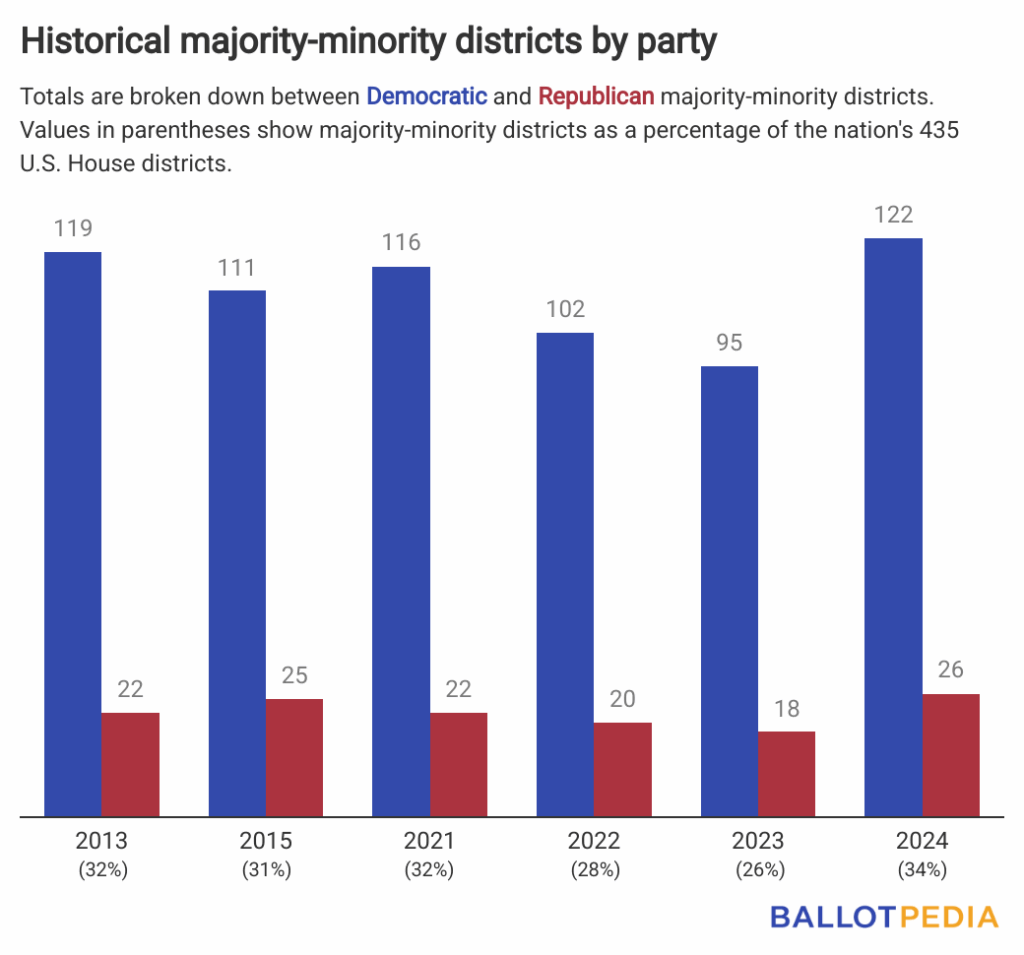
In both Democratic and Republican majority-minority districts, the largest racial group was Hispanic or Latino.
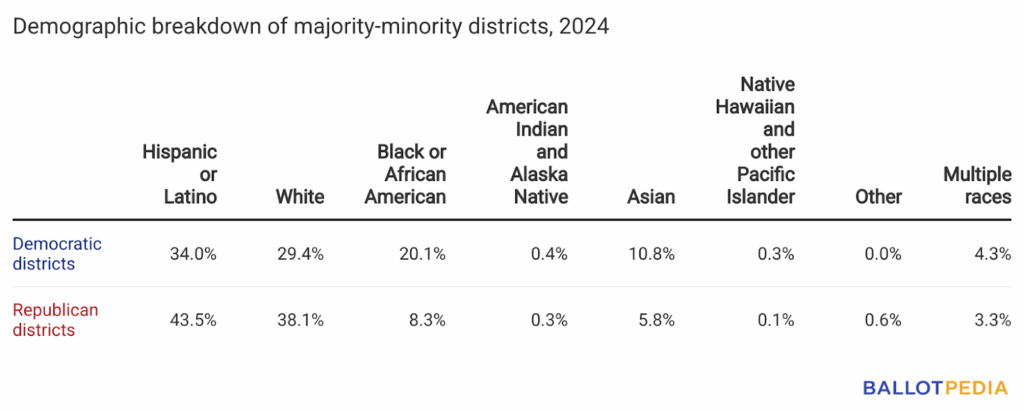
Click here to learn more about majority-minority districts.



